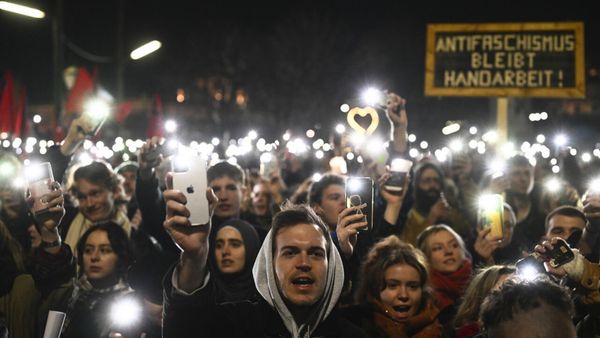
Fast Facts
- The European Parliament will vote today on its landmark Artificial Intelligence Act.
- The U.S. House will vote today on a bill that would force ByteDance to divest TikTok or face a ban.
- Spotify challenges YouTube with the addition of video.
Good morning and welcome to Tech News Now, TheStreet's daily tech rundown.
In today's edition, we're covering the pending vote on the European Union's Artificial Intelligence Act, the world's first piece of regulation regarding AI. We're also covering the U.S. House's pending vote on a bill that could result in the banning of TikTok, and a new move from Spotify that angles the music streamer against YouTube.
Tickers we're watching: Tesla (TSLA) , Microsoft (MSFT) .
DON'T MISS: I spoke with Matthieu Rouif, the co-founder and CEO of AI-powered photo editing app PhotoRoom about ethics and safety. He explained that PhotoRoom filters explicit and violent images out of its training set, a move that supplements strict guardrails that prevent the generation of sexual or violent images.
"We want to do the good thing," he said. "We want to be on the right side."
Related: Exclusive: PhotoRoom CEO on the critical ways it isn't like OpenAI or Midjourney
The EU AI Act
The European Parliament today voted in approval of its landmark AI Act.
The act, however, is expected to officially become law in May. Once it is officially enacted, the different provisions laid out in the legislation will become enforceable gradually over the next two years.
The act will ban certain artificial-intelligence systems and certain AI applications outright. This prohibition is designed to specifically target systems that might infringe on peoples' rights, including biometric categorization, emotion recognition in schools or the workplace, predictive policing and AI that manipulates human behavior or exploits vulnerable people.
There are, however, exemptions in the legislation for law enforcement, enabling the use of real-time biometric identification systems in particular scenarios, including missing-persons cases and terrorist attacks.
The act also lays out certain transparency obligations and other restrictions regarding general-purpose AI systems (such as ChatGPT) and "high-risk" systems, a term that refers to systems being used in employment, transportation and democratic processes, among other things.
Read the full text of the AI Act here.
The ban on prohibited systems will take effect six months after the act becomes law.
Related: The world’s first piece of AI regulation has been approved. Here’s what it means
The TikTok Vote
The House on March 13 voted in favor of a controversial bill that could result in a nationwide TikTok ban unless the app is spun off from parent ByteDance. The House vote was 352 to 65, with 50 Democrats and 15 Republicans voting in opposition.
“Communist China is America’s largest geopolitical foe and is using technology to actively undermine America’s economy and security," House Speaker Mike Johnson (R-Louisiana) said in a statement after the vote.
The bill now moves on to the Senate. President Joe Biden has publicly said that once the bill reaches his desk, he will sign it into law.
ByteDance released an official statement addressing the vote, mentioning how many people would be affected in the U.S. alone.
“This process was secret and the bill was jammed through for one reason: it’s a ban,” a TikTok spokesperson said in a statement.
“We are hopeful that the Senate will consider the facts, listen to their constituents, and realize the impact on the economy, 7 million small businesses, and the 170 million Americans who use our service.”
Spotify vs. YouTube
Spotify said Wednesday that it was rolling out a beta version of in-app music videos for premium subscribers in certain markets, including the U.K., Germany, Italy and Sweden.
The feature is not yet available in the U.S.
The move acts as Spotify's (SPOT) latest attempt to diversify; last year, the company rolled out a 30-second vertical video feature called Clips. It has also expanded into podcasts and audiobooks.
The music-video push puts Spotify in more direct competition with Alphabet's (GOOG) YouTube, which has had something of a corner on music videos since its inception. Vevo alone has garnered some 570 million views across 1.6 thousand videos since 2006.
“So many times in my own experience and for countless others, music videos play a key role in hooking you: taking you from being a listener to leaning in and becoming a fan,” Charlie Hellman, vice president and head of music product at Spotify, said in a statement.
“They’re an important part of so many artists’ tool kits, and it’s a natural fit for them to live in the same place that more than half a billion people choose to listen to music.”
The AI Corner: Gemini's new restrictions
In an effort to mitigate the threat of electoral misinformation that can be generated by AI models, Google said Tuesday that, "out of an abundance of caution" it was restricting the types of election-related queries that its Gemini chatbot can answer.
This restriction has already started to roll out in India, though TechCrunch reported that similar restrictions are planned across the globe.
"We take our responsibility for providing high-quality information for these types of queries seriously, and are continuously working to improve our protections,” Google said in a blog post.
The update is live in the U.S. and is rolling out in India and other countries where major elections are taking place, according to TechCrunch. It remains unclear whether this restriction will be lifted after the elections are over.
Contact Ian with tips and AI stories via email, ian.krietzberg@thearenagroup.net, or Signal 732-804-1223.
Related: Why ChatGPT Can't Turn Into Marvel Villain Ultron ... Yet







